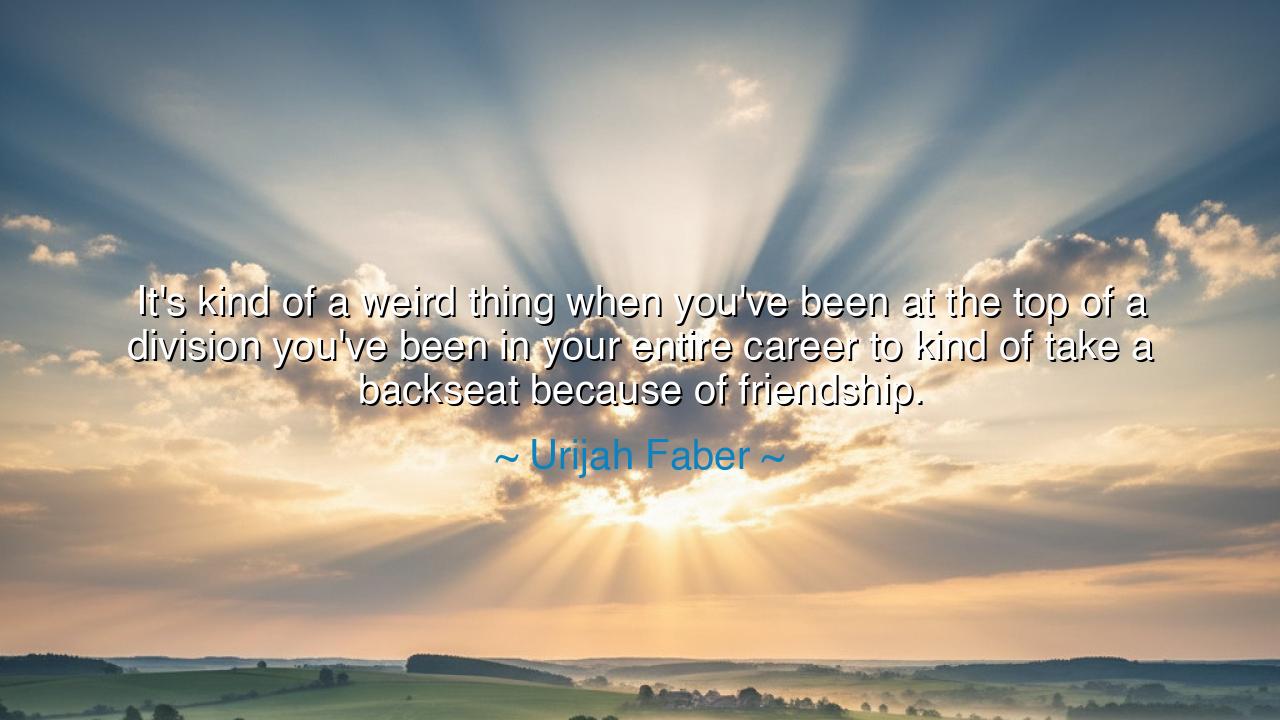
It's kind of a weird thing when you've been at the top of a
It's kind of a weird thing when you've been at the top of a division you've been in your entire career to kind of take a backseat because of friendship.






In the ever-shifting world of competition and achievement, few things are as difficult as stepping aside from a place of dominance to make room for another. Urijah Faber, a warrior in the world of mixed martial arts, speaks of a profound internal conflict: "It's kind of a weird thing when you've been at the top of a division you've been in your entire career to kind of take a backseat because of friendship." These words, spoken from the heart of one who has tasted both the heights of glory and the complexities of loyalty, reveal the deep tension that exists when personal ambition meets the bonds of friendship. It is the ancient struggle between the self and the other, between the pursuit of personal honor and the devotion to those we call comrades.
In the tales of old, great warriors faced similar dilemmas, though the contexts differed. The Samurai of Japan, bound by the strict codes of honor and loyalty, often found themselves in battles where personal glory had to be set aside for the good of the group. Miyamoto Musashi, the greatest of the Samurai, spent his life seeking the path of the warrior and the truth of the sword, but even he knew that true strength lay not in seeking individual triumph, but in the greater good of all. To win on one's own, Musashi understood, is a hollow victory if it means leaving behind the bonds of friendship and the collective strength of the group.
Faber’s words, then, echo this timeless truth. When friendship comes into conflict with the pursuit of greatness, it is not a question of strength, but of character. To willingly take a backseat, to allow someone else to take the mantle of leadership, even when one has been at the top for so long, is an act of humility and sacrifice. It is not an easy choice, for the warrior’s heart yearns for glory, for the recognition of their prowess. Yet, true greatness, as the ancients taught, lies not in personal triumph but in the ability to elevate those around you. Friendship—in its deepest form—calls for selflessness, for recognizing the strength of others and placing the group’s success above individual desires.
The ancient Greeks, in their wisdom, understood that true heroes were those who fought not for themselves but for the greater good. Achilles, though a man of great strength, had to choose between his own honor and the safety of his comrades. In his moment of reflection, he chose to put aside his personal glory for the sake of the collective. His choice, though difficult, is remembered not just for his courage on the battlefield, but for his wisdom in understanding that true honor is found in the relationships we build, not the victories we claim for ourselves. Urijah Faber’s decision to step aside for the sake of friendship reflects this ancient wisdom—a reminder that the greater good often requires sacrifice.
In our own lives, we are often faced with similar challenges. Friendship and loyalty are tested when our personal ambitions come into conflict with the needs of those we care about. The true test of character comes not when we are given everything, but when we are called to step back and let others rise. Just as Faber stepped aside for the sake of his friend, so too must we be willing to make personal sacrifices for the greater harmony of our communities, our families, and our relationships. Victory in these moments is not measured by how much we gain, but by how much we are willing to give up for the benefit of others.
The lesson of Faber’s words is profound: personal greatness is not always about standing at the front of the line, but about recognizing when it is time to support others and let them shine. In every arena of life—whether in sports, work, or personal relationships—there will be times when the greatest strength is shown not by pushing forward, but by stepping aside. We must learn to recognize the moments when our support can lift others higher, just as Faber did for his friend. This is the true measure of friendship—to honor one another’s journeys, even when it requires sacrifice on our part.
So, let us embrace the wisdom of the ancients and of those like Urijah Faber, who show us that the greatest victories are not always the ones we claim for ourselves, but those we allow others to achieve. Let us be selfless in our relationships, recognizing that the true strength of any bond lies not in how much we take, but in how much we give. Victory is sweetest when it is shared, and true friendship is born from the willingness to sacrifice personal desires for the greater good.






AAdministratorAdministrator
Welcome, honored guests. Please leave a comment, we will respond soon